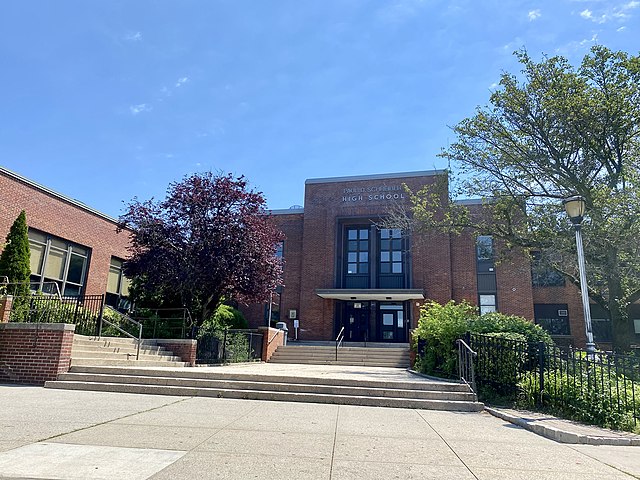
Port Washington residents assembled at the Paul D. Schreiber Senior High School Auditorium for a town hall on traffic issues.
The forum on Tuesday night, first announced in May, focused on Port Washington Boulevard. Many have reported heavy traffic since September due to school drop-offs and pickups.
“It’s always going to be constructive for us to take time and figure out if we can problem solve and come to some suggestions that may assist us moving forward,” Port Washington Schools Superintendent Michael Hynes said.
Panelists included Hynes, Board of Education President Emily Beys, Schreiber Assistant Principal David Miller, Port Washington Police Commissioner Frank Scobbo and Assistant Chief Kevin McCarroll.
There were also several Port police sergeants in attendance, as well as Councilwoman Mariann Dalimonte. Attendees could go up to the podium and discuss their ideas with the panelists and the crowd.
“There are people driving through the neighborhoods, killing pets and just leaving them on the road. So something has to be done,” said one resident. “This is because that 60-pound dog could be a 60-pound child, and then we’ve got a serious problem.”
The incident in question occurred recently during morning rush hour. A car struck and killed a dog, and the driver fled the scene, adding to many parents’ growing concerns.
McCarroll confirmed the dog story. He said that an investigation is still underway.
The question of where to move traffic further deepened the discussion. There was an appeal from residential homeowners to not push traffic into those areas.
“When we moved here, I refused to even look at a house that had to be through traffic because I was so concerned about my children’s safety,” one homeowner said. “But it’s actually turning out that we live in one of the most dangerous places in Port Washington on a weekday morning.”
Residents’ proposals included changing school start hours and increasing police presence. But many agreed that meaningful change will require more than a slight tweak.
Margaret Galbraith,a parent and member of the Transition Town Port Washington Steering Committee, detailed how the village’s traffic problems will only worsen as new property developments bring more vehicles in.
“At some point, our town is going to have to figure something out. We’re going to have to figure out bike lanes,” she said. “We could have a series of streets that are closed down at certain times that kids could probably bike on and so it could be corridors.”
“I hope my daughter is safe next year, walking to school,” she later said. She urged everyone to be open to a creative way of thinking about solutions.
Others said that the issue needs to be seen as and addressed as a cultural one.
“This might be a very good idea to use that time to tackle this general cultural issue because we see a lot of aggressive driving,” said another resident. “Everyone seems to be not happy to be courteous towards their neighbors, who they might see tomorrow.”
Yet, there was a collective recognition that a lone factor is unlikely to be the basis of every problem.
Last month, Beys and Port Washington Board of Education Vice President Julie Epstein spoke with Blank Slate Media about bus route modifications and COVID-19 as potential causes. During the forum, that subject was brought up once more.
“If you look at bus capacity, as far as the number of students, it is down considerably,” Hynes said. “So we will continue to reinforce [parents having their children ride the bus].”
Due to routes merging, some students have a morning bus ride of up to an hour. This has prompted many parents to drop off their children instead.
Attendee David Goldberg stated his motivation for doing so.
“With the immense amount of academic demands put on our kids, much more so than when I was a kid, my 15-year-old is up very often up to midnight — sometimes past midnight. I know Dr. Hynes doesn’t like to hear it, but it’s the truth,” he said. “So for a 15-year-old to go to sleep at 12:30 or one o’clock, that extra hour is precious.”
Bey attributed the bus problems to earlier financial decisions intended to save money.
“I do not remember again, exactly the amount, but I think we saved somewhere in the vicinity of $800,000 from our school budget that year,” she said.
Bey added that their existing bus contract will be increased by 18% for the coming year. The district, she added, has asked for more bidders.






